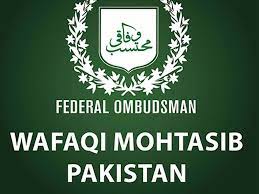Abdul Majeed Niazi
Pakistan is among the few pioneering countries in South Asia that have successfully introduced the ombudsman Institution to ensure dispensation of inexpensive and expeditious administrative justice to promote good governance. It was on 24 January 1983, that the office of Wafaqi Mohtasib (Ombudsman) was established with the explicit objective to diagnose, investigate, rectify, and redress public grievances against maladministration by the federal government agencies.
In this long journey of four decades, the institution has followed positive trajectory reflecting an uninterrupted growth and consolidation in qualitative as well as quantitative terms alongside taking steps to enhance its efficiency and efficacy. Every passing day brought refinement and fine tuning to its performance mechanism. Over the years, it has improved complaint handling mechanism comprising investigation, appraisal, review and implementation of the recommendation of Wafaqi Mohtasib. It is now fully capable of resolving complaints of maladministration in large numbers, reaching out to the complainant sby holding public hearings (Khuli Katcheries) at their doorsteps.
Wafaqi Mohtasib Institution also revived the centuries old Panchayator Jarga system and initiated Informal Resolution of Disputes (IRD) as a new initiative in 2022.The traditional system has since given way to informal dispute handling process through mutual reconciliation and mediation. Under the Article 33 the President’s Order No.1 of 1983, vests in Wafaqi Mohtasib authority to informally conciliate, amicably resolve, stipulate, settle or ameliorate any grievance without any written memorandum and without the necessity of docketing any complaint or issuing any official notice. This concept of Informal Resolution of Disputes (IRD) has been developed in the form of a pilot project both at Head Office and at Divisional level, particularly in those Divisions where no Regional Office of WMS currently exists.
The operationalization of IRD Project is an important milestone in maximizing the outreach of the Wafaqi Mohtasib‘s Office especially in remote areas of the country.
The efforts of the common man to claim relief get frustrated due to their inability to hire services of advocate for filing petitions in the courts of law and face lengthy legal process. Hence the system of informal Resolution of Disputes (IRD) adopted by the Office of Wafaqi Mohtasib responds to the dire need for resolving public complaints at the grass roots level.
To address the systemic issues leading to persistent complaints against the agencies, Wafaqi Mohtasib constituted inspection teams to undertake visit of Federal Agencies and provide them necessary guidance to improve good governance and mitigate the public grievances.Simultaneously, the Wafaqi Mohtasib Secretariat took the lead on conducting numerous studies and proposed standards of good governance to various government agencies. The honourable Supreme Court also made a number of other references to the Wafaqi Mohtasib on the issues of public concern and after carrying out necessary investigation reports were submitted to the apex Court.
Under the Outreach Complaint Resolution (OCR) system, Investigation Officers visit various districts to redress grievances at the door steps of the complainants. The OCR has been further strengthened by organizingKhuli Katcheries in remote areas to enable the complainants to raise the grievances in the presence of representatives of federal agencies closer to their homes and get immediate relief.It also creates greater awareness among the general public about the functioning of the office of the Wafaqi Mohtasib and availability of this cost free and easily accessible forum for redressal of their grievances against Federal Agencies.
The presence of Wafaqi Mohtasib’s Regional Offices in seventeen cities, as against four originally, with two complaint centres at Wana (South Waziristan) and Sadda (Kurram Agency) has further enhanced its outreach to general public.
The other important milestone achieved by Wafaqi Mohtasib is the establishment of Grievance Commissioner’s Office for Overseas Pakistanis, which offers an institutional framework for addressing individual complaints and systemic issues faced by the Overseas Pakistanis. One Window Facilitation Desks have been established at all International Airports of the country to facilitate Overseas Pakistanis and their families travelling to or from Pakistan. In addition, on the special direction of Federal Ombudsman, Focal Persons have been appointed in Pak Missions abroad to personally hear and resolve problems faced by Pakistani Diaspora.
The service and contribution of the Federal Ombudsman Institution in promoting good governance, the rule of law and respect for human rights is well recognized at the international level as well. It has played a pivotal role from the platformof International Ombudsman Institute (IOI), Asian Ombudsman Association (AOA) and Organization of Islamic Cooperation Ombudsman Association (OICOA) in promoting Ombudsmanship in Asia and beyond. Pakistan hosted the first Asian Ombudsman Conference at Islamabad in 1996, establishing the Asian Ombudsman Association (AOA) which is non-political, independent, democratic and professional body of international character representing more than two thirds population of the world. With its secretariat at Islamabad, the AOA has traversed a long way since its inception which is reflected in continued expansion of its membership and adoption of well thought out rules and regulations of international standards.
In this long journey of four decades, the office of Wafaqi Mohtasib has established high standards of performance in the service of general publicwhich is reflected in the highest ever number of 164, 173 complaints (49% increase) and disposal reached an all-time high of 157,798 (47.7% increase) during the last year. Similarly 137423 overseas Pakistanis were provided relief by the Grievances Commissioner Cell of Wafaqi Mohtasib in year 2022, marking 133% increase as against 58990 cases of relief in 2021. The office of Wafaqi Mohtasib enjoys full support at the highest level to bring about much needed change in the lives of our people by improving the service delivery of the Federal agencies. Building on the accomplishment of the past, the goals that the Office of the Wafaqi Mohtasib seeks to pursue in the coming years have a lot to offer to the people facing administrative excesses of the governmental agencies. The continued goodwill and across the board support from all segments of society holds a great promise for the future of this institution.







